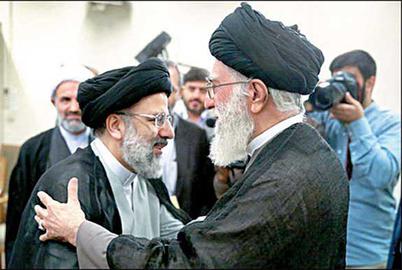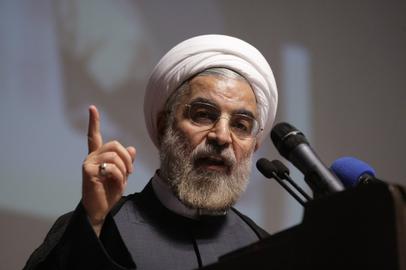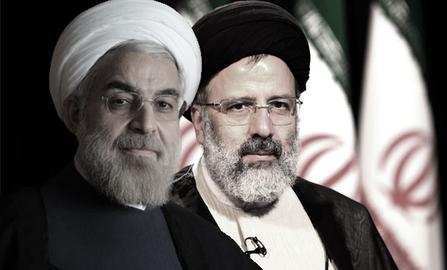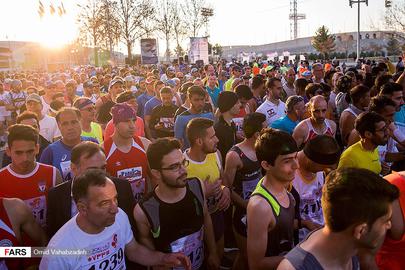With the May 19 Iranian presidential election fast approaching, a serious rival to the incumbent Hassan Rouhani has emerged: Ebrahim Raeesi. Raeesi, 57, is not a household name outside Iran, but he is certainly influential, and currently holds four very important posts in Iran.
First, he is the guardian of the Astan Quds Razavi foundation, which translates as “The Holy Belongings of Imam Reza.” The foundation oversees the Shrine of the 8th Shia Imam and its properties in the city of Mashhad, and enjoys the religious prestige and economic benefits that come with this honor. But this is no ordinary religious endowment. Lands owned by the foundation are estimated to be worth around $20 billion. In addition, it benefits from the annual pilgrimage of around 25 million Shias, mostly from Iran and Iraq. The guardian of Astan Quds is appointed directly by the Supreme Leader. He is not accountable to the government.
Second, Raeesi is the prosecutor of the Special Clergy Court. The court has the exclusive power of trying transgressions committed by the clergy and, again, it answers only to the Supreme Leader, who appoints its president and its prosecutor. The fact that Ayatollah Khamenei has entrusted both jobs to Raeesi clearly shows the high level of trust the Supreme Leader has in him. Raeesi is also a former student of Ayatollah Khamenei, and attended his classes on Islamic jurisprudence for 14 years, between 1991 and 2005, so there is a strong bond between the two. It is clear that Raeesi, who now teaches his own jurisprudence classes in Mashhad, owes both his political and religious careers to Ayatollah Khomeini personally.
Third, Ebrahim Raeesi is a member of the governing body of the Assembly of Experts. Under the constitution of the Islamic Republic, this assembly decides the next supreme leader and, theoretically at least, supervises the incumbent supreme leader and has the power to remove him. Raeesi, who has been a member of the assembly for the past 11 years, is also a member of its Research Committee that, through a special three-member sub-committee, is responsible for vetting potential candidates for the Supreme Leader’s position. Of course, the identities of the candidates are kept secret until the time comes to reveal them to the Assembly of Experts as a whole.
Fourth, Ebrahim Raeesi is a member of the Combatant Clergy Association, a conservative clerical association that for all practical purposes behaves like a political party. It is one of two such associations in Iran, the other being the similarly and confusingly named Association of Combatant Clerics, comprised of reformist and moderate clergy. But as far as political views go, Raeesi’s positions are not well known, as he seldom comments publicly on politics.
Role in 1988 Mass Murder
For the most part, Raeesi’s career has been in Iran’s judiciary. For 37 years, from the 1979 Islamic Revolution until 2016, when he was appointed head of Astan Qods Razavi, he served in various judicial positions — from an ordinary judge in a small town to the First Deputy of the Iranian Judiciary. The most well-known case he was involved in goes back to the summer of 1988, when Ayatollah Khomeini assigned a three-member panel to decide the fate of thousands of political prisoners. Ebrahim Raeesi was one of the three. In the end, the panel ordered the mass execution of the prisoners without due process of law and after very short deliberations. Ayatollah Montazeri, who at the time was Khomeini’s deputy, later reported that 3,800 prisoners were executed. Opponents of the Islamic Republic regard the deaths as mass murder, and have repeatedly demanded that the individuals responsible, including Ebrahim Raeesi, be put on trial for this crime.
Raeesi, however, has always defended himself. He has said he carried out Ayatollah Khomeini’s orders without hesitation. And he has never minced words in defending the regime’s actions and the implementation of Islamic laws. He is proud to order for thieves to have their hands cut off as punishment, is a staunch supporter of Iranian military intervention in Syria, favored the execution of protesters in the aftermath of the disputed 2009 presidential election, and promotes exporting the Islamic revolution through support of Shia religious and paramilitary groups in the Middle East.
He has been shielded from domestic criticism through the trust and support of Ayatollah Khomeini, which clearly remains intact.
Aiming High
When Raeesi was appointed head of Astan Qods Razavi in 2016, a large number of hardliners and military leaders close to the Supreme Leader began to flock to his side. General Mohammad Ali Jafari, commander-in-chief of the Revolutionary Guards, and General Ghasem Soleimani, commander of the Islamic Republic expeditionary Qods Force fighting in Syria, have held well-publicized meetings with Raeesi, and the Revolutionary Guards have become involved in joint projects with Astan Qods Razavi. One such project is the Benevolence Foundation, which plans to distribute food to poor villagers and help young men financially so they can afford to marry. Critics of the initiative say these actions are done with an eye toward the election but there are analysts who believe the aim reaches much further than merely the May election.
Some observers believe that Ebrahim Raeesi could be a key candidate to succeed Ayatollah Khamenei as the Supreme Leader. But since he is not a well-known figure, Khamenei’s circle and the Revolutionary Guards need to make a name for him among Iranians — so actions such as dispensing money to the underprivileged and food distribution through the Benevolence Foundation fit into this project.
Seen from this point of view, Raeesi’s candidacy for the presidency is also part of this agenda. Raeesi lacks a strong political background, so his supporters are trying to convince principlists across the board that he has the potential to become the president of the Islamic Republic. If they can be convinced of this then, logically, they will also support him in becoming the next Supreme Leader.
This is particularly important because, following the death of former President Akbar Hashemi Rafsanjani, for reformist, Hassan Rouhani has become the most important figure to succeed Khamenei. On paper at least, President Rouhani has no chance of gaining approval from the Assembly of Experts. But in reality, his political background is much more impressive than Ebrahim Raeesi’s, and he will likely become a powerful player in the post-Khamenei era. This is one of the reasons Iran’s conservative principlists have united to defeat Rouhani in the presidential election. And the sudden death of Hashemi Rafsanjani has heightened their sense of urgency. They know well enough that if something were to happen to Khamenei while Rouhani is still president, his power to influence events and shape politics could be a threat to them. For them, it is preferable to bring his presidency to a close in May. Plus, Rouhani’s defeat could also result in an end to the influence of Rafsanjani’s supporters in the higher levels of the regime once and for all — or at least that is what they hope.
It’s clear that as Raeesi emerges as a serious rival for Rouhani, more than the presidency is at stake. It’s a sign of the battle to come, one of the most important battles there is in Iran: deciding who will succeed the Supreme Leader Ayatollah Khamenei.
visit the accountability section
In this section of Iran Wire, you can contact the officials and launch your campaign for various problems



























comments